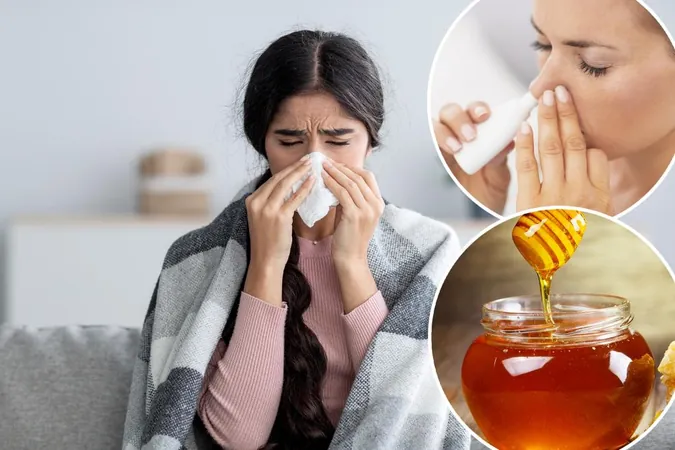
Prepare for the Quad-Demic! Essential Cold and Flu Supplies You Need Now – Doctor-Approved!
2025-01-24
Author: Ting
Essential Over-the-Counter Medicines
Dr. Neil Bhavsar, an emergency medicine physician, emphasizes the importance of stocking your medicine cabinet with essential over-the-counter remedies. Cough medications containing dextromethorphan can be instrumental in calming persistent coughs, while guaifenesin works wonders to loosen mucus. Fever reducers like acetaminophen and ibuprofen should also be on your shopping list.
If you find sinus troubles creeping in, nasal sprays with phenylephrine or oxymetazoline can alleviate congestion. However, be cautious; limiting nasal spray use to three days is advisable to avoid rebound congestion, a vicious cycle that can exacerbate your condition.
When sinus congestion becomes a significant issue, consider oral decongestants that include pseudoephedrine. While they can be effective, those with pre-existing hypertension should be careful, as these medications can elevate blood pressure.
For sore throats, lozenges can provide immediate relief and are particularly effective for those persistent post-viral coughs. Some options even contain menthol to soothe irritated airways. Just remember to check the labels—many medications contain multiple active ingredients, which could lead to unintentional overdosing!
Supplements That May Help
While skepticism toward supplements is generally warranted, some can genuinely assist in fighting off illness. Dr. Bhavsar notes that Vitamin C can reduce the severity and duration of colds, while zinc lozenges are most effective when taken at the first sign of symptoms. However, moderation is key; excessive zinc intake may lead to stomach issues.
Additionally, consider probiotics to strengthen your immune system, and if you're low on it, Vitamin D can offer a welcome boost. Echinacea and elderberry are also popular choices, although opinions on their effectiveness are mixed.
Kitchen Remedies for Comfort
Your journey to recovery doesn't solely depend on medications. Honey is a natural remedy renowned for its antibacterial and anti-inflammatory properties—softening sore throats and suppressing coughs effectively. However, it's crucial to avoid honey for children under one year old due to the risk of botulism.
Another excellent home remedy is salt. Gargling with salt water can soothe a sore throat and clear nasal congestion. You can also whip up a sinus rinse at home using a simple mixture of non-iodized salt, baking soda, and distilled water, which can help clear nasal passages.
To stay hydrated, aim for plenty of fluids. Whether it's water, herbal tea, or comforting chicken soup—a classic for a reason—these foods can help alleviate symptoms while providing vital nutrients to spur your recovery.
Must-Have Tools for Monitoring Health
Certain tools can support your health more than you might think. A thermometer is a staple that should be in every home. Digital thermometers are straightforward to use for adults, while tympanic varieties might work best for infants.
For individuals with serious health issues, a pulse oximeter can be a lifesaver. Monitoring oxygen levels is critical because low readings could indicate developing pneumonia or a worsening lung infection.
Lastly, consider investing in a humidifier. Many people find relief from nasal congestion and throat dryness in the comfort of humidified air, even if the scientific consensus on its efficacy remains uncertain.
Get Prepared NOW!
With the quad-demic surging across the nation, being prepared can make all the difference. Stock your shelves and medicine cabinets with these essentials to face the upcoming cold and flu season like a pro. Your health may depend on it!



 Brasil (PT)
Brasil (PT)
 Canada (EN)
Canada (EN)
 Chile (ES)
Chile (ES)
 Česko (CS)
Česko (CS)
 대한민국 (KO)
대한민국 (KO)
 España (ES)
España (ES)
 France (FR)
France (FR)
 Hong Kong (EN)
Hong Kong (EN)
 Italia (IT)
Italia (IT)
 日本 (JA)
日本 (JA)
 Magyarország (HU)
Magyarország (HU)
 Norge (NO)
Norge (NO)
 Polska (PL)
Polska (PL)
 Schweiz (DE)
Schweiz (DE)
 Singapore (EN)
Singapore (EN)
 Sverige (SV)
Sverige (SV)
 Suomi (FI)
Suomi (FI)
 Türkiye (TR)
Türkiye (TR)
 الإمارات العربية المتحدة (AR)
الإمارات العربية المتحدة (AR)